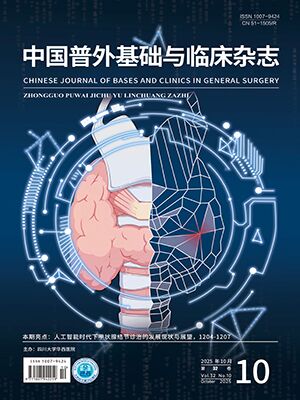| 1. |
刘健博, 吕炘沂, 邹雨恒, 等. 多周期新辅助化疗联合阿帕替尼对进展期直肠癌的疗效评价—基于 DACCA 数据库的辅助研究. 中国普外基础与临床杂志, 2019, 26(6): 728-734.
|
| 2. |
汪晓东, 安丽珉, 李立. 数据库研究第二部分: 结直肠癌的住院流程管理. 中国普外基础与临床杂志, 2019, 26(4): 469-475.
|
| 3. |
汪晓东, 李立. 数据库建设第一部分: 个人数据的标签与结构化. 中国普外基础与临床杂志, 2019, 26(3): 335-342.
|
| 4. |
汪晓东, 李希, 何欣林, 等. 数据库研究第一部分: 区域性医疗中心的结直肠癌与人群特征. 中国普外基础与临床杂志, 2019, 26(2): 212-220.
|
| 5. |
汪晓东, 吕炘沂, 黄明君, 等. 数据库建设第二部分: 结直肠癌住院流程管理的标签与结构化. 中国普外基础与临床杂志, 2019, 26(7): 852-855.
|
| 6. |
于瑞璇, 何欣林, 张秋露, 等. 华西 DACCA 的辅助研究: 单独的新辅助化疗不会影响直肠癌术后近期的肛门功能. 中国普外基础与临床杂志, 2019, 26(5): 595-601.
|
| 7. |
Moore JS, Aulet TH. Colorectal cancer screening. Surg Clin North Am, 2017, 97(3): 487-502.
|
| 8. |
Kijima S, Sasaki T, Nagata K, et al. Preoperative evaluation of colorectal cancer using CT colonography, MRI, and PET/CT. World J Gastroenterol, 2014, 20(45): 16964-16975.
|
| 9. |
Taflampas P, Christodoulakis M, de Bree E, et al. Preoperative decision making for rectal cancer. Am J Surg, 2010, 200(3): 426-432.
|
| 10. |
Benson AB, Venook AP, Al-Hawary MM, et al. Rectal Cancer, Version 2. 2018, NCCN Clinical Practice Guidelines in Oncology. J Natl Compr Canc Netw, 2018, 16(7): 874-901.
|
| 11. |
Benson AB 3rd, Venook AP, Cederquist L, et al. Colon Cancer, Version 1. 2017, NCCN Clinical Practice Guidelines in Oncology. J Natl Compr Canc Netw, 2017, 15(3): 370-398.
|
| 12. |
国家卫生计生委医政医管局, 中华医学会肿瘤学分会. 中国结直肠癌诊疗规范(2017 年版). 中华胃肠外科杂志, 2018, 21(1): 92-106.
|
| 13. |
Ippolito D, Drago SG, Franzesi CT, et al. Rectal cancer staging: Multidetector-row computed tomography diagnostic accuracy in assessment of mesorectal fascia invasion. World J Gastroenterol, 2016, 22(20): 4891-4900.
|
| 14. |
Nerad E, Lambregts DM, Kersten EL, et al. MRI for local staging of colon cancer: can MRI become the optimal staging modality for patients with colon cancer? Dis Colon Rectum, 2017, 60(4): 385-392.
|
| 15. |
Zhou L, Wang JZ, Wang JT, et al. Correlation analysis of MR/CT on colorectal cancer lymph node metastasis characteristics and prognosis. Eur Rev Med Pharmacol Sci, 2017, 21(6): 1219-1225.
|
| 16. |
So JS, Cheong C, Oh SY, et al. Accuracy of preoperative local staging of primary colorectal cancer by using computed tomography: reappraisal based on data collected at a highly organized cancer center. Ann Coloproctol, 2017, 33(5): 192-196.
|
| 17. |
Hamet P, Tremblay J. Artificial intelligence in medicine. Metabolism, 2017, 69S: S36-S40.
|
| 18. |
Recht M, Bryan RN. Artificial intelligence: threat or boon to radiologists? J Am Coll Radiol, 2017, 14(11): 1476-1480.
|
| 19. |
Sailem HZ, Bakal C. Identification of clinically predictive metagenes that encode components of a network coupling cell shape to transcription by image-omics. Genome Res, 2017, 27(2): 196-207.
|
| 20. |
Su H, Shen Y, Xing F, et al. Robust automatic breast cancer staging using a combination of functional genomics and image-omics. Conf Proc IEEE Eng Med Biol Soc, 2015, 2015: 7226-7229.
|
| 21. |
Huang X, Cheng Z, Huang Y, et al. CT-based radiomics signature to discriminate high-grade from low-grade colorectal adenocarcinoma. Acad Radiol, 2018, 25(10): 1285-1297.
|
| 22. |
甘志明, 汪晓东, 吕东昊, 等. 围手术期免疫调节治疗对直肠癌术后复发的影响. 南方医科大学学报, 2015, 35(4): 562-566.
|
| 23. |
Wang X, Lv D, Song H, et al. Multimodal preoperative evaluation system in surgical decision making for rectal cancer: a randomized controlled trial. Int J Colorectal Dis, 2010, 25(3): 351-358.
|
| 24. |
汪晓东, 欧阳书睿, 吕东昊, 等. 三种不同炎性因子联合多层螺旋 CT 对结肠癌术前分期与术式预测的比较研究. 中华胃肠外科杂志, 2010, 13(10): 732-736.
|
| 25. |
Ren L, Upadhyay AM, Wang L, et al. Mortality rate prediction by Physiological and Operative Severity Score for the Enumeration of Mortality and Morbidity (POSSUM), Portsmouth POSSUM and Colorectal POSSUM and the development of new scoring systems in Chinese colorectal cancer patients. Am J Surg, 2009, 198(1): 31-38.
|
| 26. |
汪晓东, 邓磊, 秦昌龙, 等. 术前血清淀粉样蛋白 A 水平对低位局部进展直肠癌手术方案选择的价值. 中国普外基础与临床杂志, 2009, 16(8): 667-670.
|
| 27. |
汪晓东, 吕东昊, 宋欢, 等. 多模式术前评估系统对中低位直肠癌手术方案选择的价值: 一项随机对照试验. 中国普外基础与临床杂志, 2009, 16(6): 487-492.
|
| 28. |
汪晓东, 宋欢, 吕东昊, 等. 术前联合评估直肠上段癌与手术方案选择的随机对照试验. 中国普外基础与临床杂志, 2009, 16(4): 322-326.
|
| 29. |
Giessen C, Nagel D, Glas M, et al. Evaluation of preoperative serum markers for individual patient prognosis in stage Ⅰ –Ⅲ rectal cancer. Tumour Biol, 2014, 35(10): 10237-10248.
|
| 30. |
Takeda K, Kudo SE, Mori Y, et al. Accuracy of diagnosing invasive colorectal cancer using computer-aided endocytoscopy. Endoscopy, 2017, 49(8): 798-802.
|
| 31. |
Rex DK, Adler SN, Aisenberg J, et al. Accuracy of capsule colonoscopy in detecting colorectal polyps in a screening population. Gastroenterology, 2015, 148(5): 948-957.e2.
|
| 32. |
Brenner H, Chen C. The colorectal cancer epidemic: challenges and opportunities for primary, secondary and tertiary prevention. Br J Cancer, 2018, 119(7): 785-792.
|
| 33. |
郑荣寿, 孙可欣, 张思维, 等. 2015 年中国恶性肿瘤流行情况分析. 中华肿瘤杂志, 2019, 41(1): 19-28.
|
| 34. |
赵晓敏, 李云涛, 季国忠. 结直肠癌筛查现状与进展. 中国临床研究, 2016, 29(6): 838-841.
|




